Nouadhibou
20º54.737' N
17º02.500' W
After arriving in Africa, it was another 24 hours before we set foot on dry land. Nouadhibou doesn't receive a lot of tourists from the sea, and we needed special permission to dock in the city, which took time for our local guide to arrange. When we finally pulled into port, I looked around at the other boats: there were hundreds of small fishing boats and dozens of big cargo ships, but we were the only sailboat in the area.
As we were docking, my first impression was that we were being treated like royalty or like celebrities, because there was a large gathering of people waiting to greet us, everyone wearing regal robes. I soon found out that the robes are just a part of the culture -- they keep the sand off their clothes -- and, aside from our guide Adeja, all the people were there to ask us if we would pay them to guard our ship.
Our first stop was the police station, a dark and foreboding office, where we had our passports and visas examined. Even though the police chief was very polite and quite pleasant to talk to, it felt like we were being interrogated and needed to give the "right" answers...or else!
Next we took a car ride through the lively city, and then drove a few miles south to a hotel in Cansado that Adeja had arranged for us. I spent the afternoon wandering around Cansado, taking pictures and listening to the hypnotic Islamic prayers emanating from loudspeaker towers throughout the city.
After dinner, we went back into the city with Adeja and his friends. The city had turned into a huge bazaar, with every square inch occupied by a blanket sprawled out with goods, or by merchants and customers, noisily prodding and haggling. We snaked our way through the crowd, constantly pushing and squirming and apologizing and thanking, and I got disoriented and lost several times. I would probably still be there wandering around if my travel companions hadn't been keeping an eye on me.
We returned to the hotel, where I slept on land for the first time since leaving America. Before going to bed though, I took full advantage of the amenities by charging all of my gadgets, catching up on my journal and my blog, and watching a DVD into the early morning, so it was actually one of my less restful nights.
The following day, we went to main tourist site of the city: the train station. Called the "longest train in the world," the train is typically around 3 km in length and transports iron ore and passengers between Nouadhibou and Zouerat. Dozens of people waited patiently in the sand, some of them sitting or lying down a few feet from the tracks, and we spent a half hour chatting and taking photos with them. When the train arrived, it took less than ten minutes for them to load the wagons with hundreds of empty iron barrels and gas tanks -- quite an operation to watch!
Below are some pictures from the city:
Fishermen about to head out for the day:
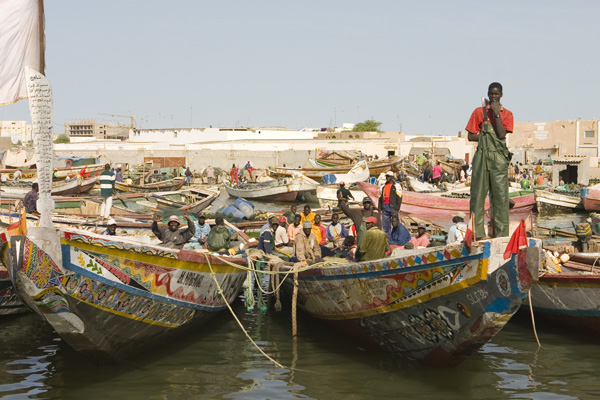
Our hotel in the background, with some kids playing in the water and a man bringing his sheep down for a drink:
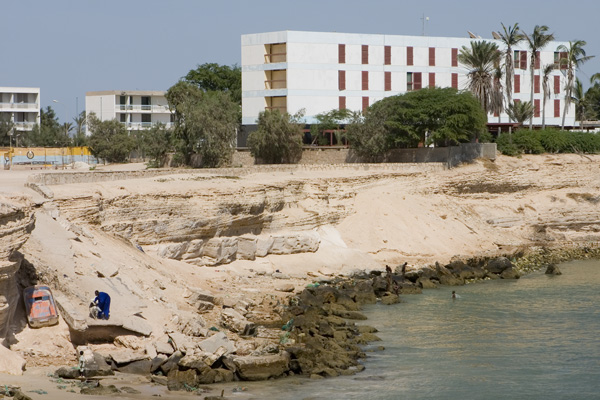
Adeja Sidi El Moctar, our wonderful guide and friend:
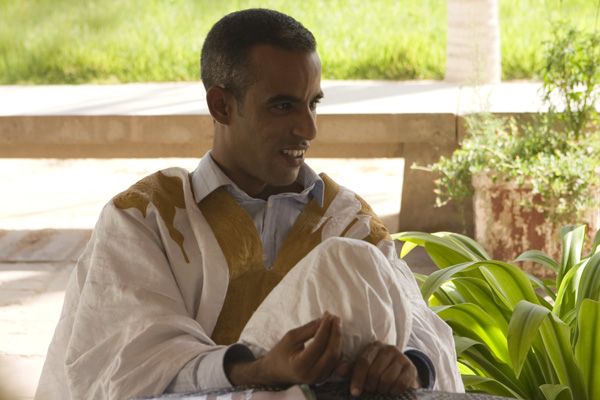
The train station:
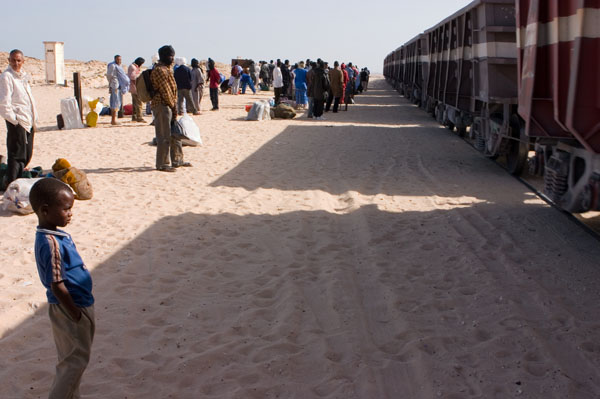

And a few other pics:
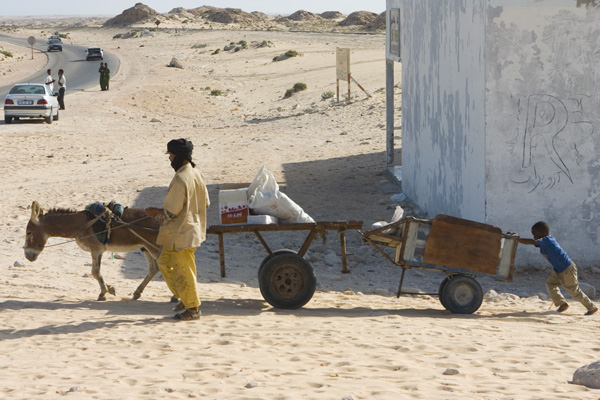
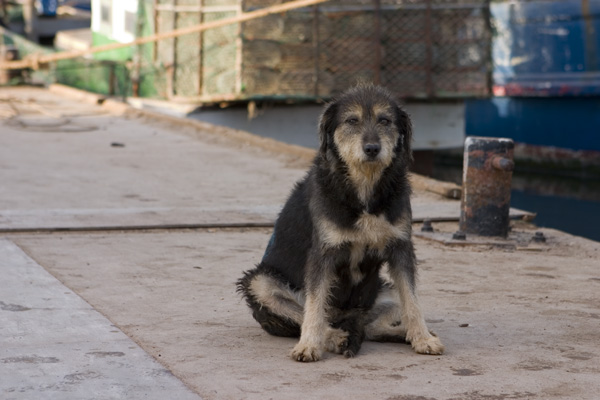

17º02.500' W
After arriving in Africa, it was another 24 hours before we set foot on dry land. Nouadhibou doesn't receive a lot of tourists from the sea, and we needed special permission to dock in the city, which took time for our local guide to arrange. When we finally pulled into port, I looked around at the other boats: there were hundreds of small fishing boats and dozens of big cargo ships, but we were the only sailboat in the area.
As we were docking, my first impression was that we were being treated like royalty or like celebrities, because there was a large gathering of people waiting to greet us, everyone wearing regal robes. I soon found out that the robes are just a part of the culture -- they keep the sand off their clothes -- and, aside from our guide Adeja, all the people were there to ask us if we would pay them to guard our ship.
Our first stop was the police station, a dark and foreboding office, where we had our passports and visas examined. Even though the police chief was very polite and quite pleasant to talk to, it felt like we were being interrogated and needed to give the "right" answers...or else!
Next we took a car ride through the lively city, and then drove a few miles south to a hotel in Cansado that Adeja had arranged for us. I spent the afternoon wandering around Cansado, taking pictures and listening to the hypnotic Islamic prayers emanating from loudspeaker towers throughout the city.
After dinner, we went back into the city with Adeja and his friends. The city had turned into a huge bazaar, with every square inch occupied by a blanket sprawled out with goods, or by merchants and customers, noisily prodding and haggling. We snaked our way through the crowd, constantly pushing and squirming and apologizing and thanking, and I got disoriented and lost several times. I would probably still be there wandering around if my travel companions hadn't been keeping an eye on me.
We returned to the hotel, where I slept on land for the first time since leaving America. Before going to bed though, I took full advantage of the amenities by charging all of my gadgets, catching up on my journal and my blog, and watching a DVD into the early morning, so it was actually one of my less restful nights.
The following day, we went to main tourist site of the city: the train station. Called the "longest train in the world," the train is typically around 3 km in length and transports iron ore and passengers between Nouadhibou and Zouerat. Dozens of people waited patiently in the sand, some of them sitting or lying down a few feet from the tracks, and we spent a half hour chatting and taking photos with them. When the train arrived, it took less than ten minutes for them to load the wagons with hundreds of empty iron barrels and gas tanks -- quite an operation to watch!
Below are some pictures from the city:
Fishermen about to head out for the day:

Our hotel in the background, with some kids playing in the water and a man bringing his sheep down for a drink:

Adeja Sidi El Moctar, our wonderful guide and friend:

The train station:


And a few other pics:




0 Comments:
Post a Comment
<< Home